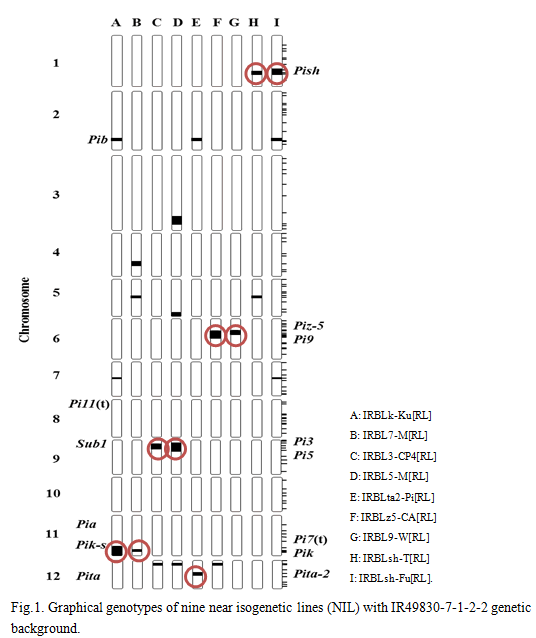Multiline variety for rainfed lowland rice variety
Description
Rice blast, caused by Pyricularia grisea (Cooke) Sacc., is one of the most serious diseases affecting rice (Oryza sativa L.). It inflicts severe damage to rice production in temperate and tropical regions. The use of resistant varieties is the most economical and effective method to control blast disease (Yu et al., 1991). However, the true resistance of varieties governed by a major gene is often broken down due to the emergence of virulent races after only several years of use. Increasing host genetic diversity through the use of a multiline variety consisting of several isogenic lines (ILs) or varietal mixtures with different major genes is one of several useful strategies to avoid easy breakdown of resistance. The effectiveness of multi lines or mixed varietal plantings in reducing blast disease has been demonstrated in Japan. However, multiline varieties for blast resistance have yet to be developed and released for use in the tropics.
Rice blast is particularly severe in rainfed lowlands that are prone to droughts. To produce the durable protection system against blast disease in the rainfed lowlands under tropical conditions using genetic diversity of rice variety, the multiline variety consisting of several isogenetic lines with elite Indica-type genetic background was developed.
A set of near-isogenic lines (NILs) for blast resistance genes was developed by using an Indica-type elite rice variety, IR49830-7-1-2-2, as a genetic background suitable for rainfed lowland conditions in the tropics. Initially, it was revealed that IR49830-7-1-2-2 harbors five blast resistance genes – Pia, Pib, Pik-s, Pita, and Pi11(t) – by using a differential system involving 19 selected standard blast isolates from the Philippines. Based on this result, nine near-isogenic lines were developed targeting eight resistance genes – Pik, Pi7(t), Pi3, Pi5, Pita-2, Piz-5, Pish, and Pi9 – by recurrent backcrossing. The introgression of each resistance gene in the NILs was confirmed by reaction patterns to the blast isolates, allelism tests, and DNA marker analysis. In addition, a genome-wide DNA marker survey revealed that most of the chromosome regions in each NIL were of the IR49830-7-1-2-2 type. The agricultural characteristics of most of the developed NILs were almost the same as those of IR49830-7-1-2-2. Moreover, with one exception, they showed submergence tolerance similar to IR49830-7-1-2-2. The developed NILs could be used as a multiline variety suitable for rainfed lowlands in the tropics.
Figure, table
-
Blank regions on each chromosome indicate introgression from donor varieties and red circles show the locations of target resistance genes. The gene symbols on the left side indicate the resistance and tolerant genes harboring in the genetic background of IR49830-7-1-2-2. The right side gene symbols indicate the introduced resistance genes into IR49830-7-1-2-2.
1-12: Chromosome number
- Affiliation
-
Japan International Research Center for Agricultural Sciences Biological Resources and Post-harvest Division
- Classification
-
Research B
- Research project
- Program name
- Term of research
-
FY 2011 (FY 2011-FY 2015)
- Responsible researcher
-
Fukuta Yoshimichi ( Tropical Agriculture Research Front )
Koide Yohei ( Research Fellow of the Japan Society for the Promotion of Science )
KAKEN Researcher No.: 70712008Yanagihara Seiji ( Biological Resources and Post-harvest Division )
MIERUKA ID: 001780Kobayashi Nobuya ( Institute of Crop Science, NARO )
KAKEN Researcher No.: 70252799Kato Hiroshi ( Institute of Crop Science, NARO )
Imbe Tokio ( Kyushu Okinawa Agricultural Research Center, NARO )
Tsunematsu Hiroshi ( Biological Resources and Post-harvest Division )
KAKEN Researcher No.: 50360392Ebron Leodegario A. ( International Rice Research Institute )
Telebanco-Yanoria Mary Jeanie ( Research Fellow of the Japan Society for the Promotion of Science )
Maruyama Sachio ( University of Tsukuba )
KAKEN Researcher No.: 40361307Yokoo Masao ( University of Tsukuba )
- ほか
- Publication, etc.
-
Koide et al. (2011) Field Crops Research 123: 19-27
- Japanese PDF
-
2011_10_A4_ja.pdf142.6 KB
- English PDF
-
2011_10_A4_en.pdf89.34 KB

